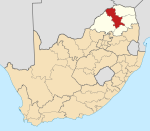Mankweng
Mankweng | ||
|---|---|---|
PO box 0727 | ||
Mankweng, also called Turfloop,
History
Mankweng developed in the 1960s when the
University of Limpopo and Mankweng Hospital
Mankweng as a community is very dynamic, and draws skilled professionals into the area because the area houses a leading regional hospital, Mankweng Campus Hospital, a university (in the form of University of Limpopo), a regional Magistrate court, and a public library. In recent times, the area has been growing rapidly with local residents next to the University converting their homes into rental space in order to house the growing population of students from many parts of the country, with some coming from as far as East and North Africa.
Transport
Transport to Mankweng from Polokwane ranges from buses to minibus taxis and private taxi services.
The R71 which is the main road to Mankweng and Tzaneen has more than a million vehicles driving on it daily, and congestion usually is seen in the morning and afternoons.
Mankweng is a hub for villages around it, so transport is at place for those travelling to and from Mankweng. Moria, the
The main public bus services which operate around Mankweng are Great North Transport, Madodi and Bahwaduba Bus Service which is a bus service belonging to the ZCC. There's also a community website that caters for news, business directory and others
References

